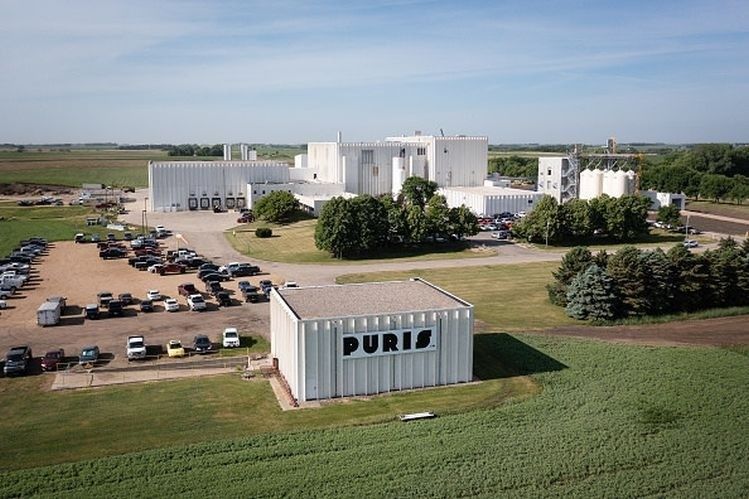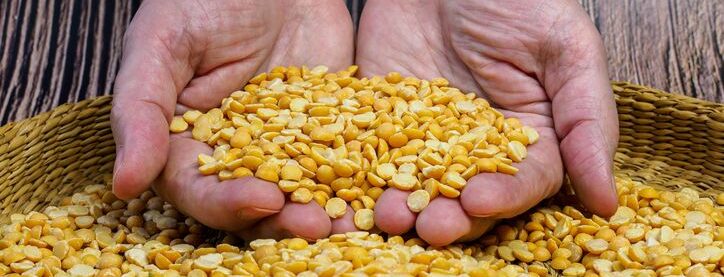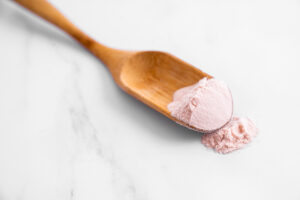The US International Trade Commission (ITC) has made a preliminary determination that there is “a reasonable indication” Chinese companies are dumping high protein content (HPC) pea protein in the US “at less than fair value and subsidized by the government of China.”
The ITC investigation follows a petition [case # 701-692] filed in July by pea protein processor PURIS, which claims it has recently been forced to lay off workers at its plant in Turtle Lake Wisconsin as a “direct result of dumped and subsidized imports from China.”
The US Department of Commerce (DOC), which is also looking into allegations that China is harming US pea protein producers by dumping HPC pea protein on the US market, is expected to make its preliminary determination on anti-dumping duties in December and a final determination next March. A final determination on a parallel investigation into countervailing duties is expected in December.
Should both the ITC and DOC come to an affirmative final determination, the DOC will instruct US Customs and Border Protection to impose import duties on HPC pea protein from China “equivalent to the dumping and subsidy margins.”

Pea protein production capacity in North America
While pea protein still lags behind soy in the plant-based protein stakes, North American production capacity has been expanding rapidly in recent years, with PURIS opening a plant in Dawson, Minnesota; Ingredion opening a facility in Nebraska; ADM opening a plant in North Dakota; and Roquette opening a plant in Portage la Prairie, Manitoba, Canada.
According to the ITC’s 196-page preliminary report, however, domestic producers are being substantially undercut by cheap Chinese imports: “The pricing data show pervasive underselling, with subject imports underselling the domestic like product in all 52 quarterly comparisons… at margins ranging from 25.6 to 72%and averaging 45.4%.”
In 2022, five US purchasers of pea protein who responded to the ITC investigation purchased 96.6% of it from China, 2.3% from US producers, and 1.1% from other countries.
Four of the five purchasers reported selecting Chinese HPC pea protein because of the lower prices, with import purchase costs on average 52.3% below domestic sales prices.
Meanwhile, PricewaterhouseCoopers (PwC) has yet to announce a buyer for the assets of Merit Functional Foods, a pea and canola protein processor which went into receivership on March 1 just two years after opening a state-of-the art plant in Winnipeg, Canada.
‘PURIS was forced to idle its operations at Turtle Lake as a direct result of dumped and subsidized imports from China’
According to PURIS’ petition, China’s production of pea starch has been steadily rising. As there is relatively low demand for the pea protein coming out of the starch facilities, it is being sent to the US at bargain basement prices.
“There is compelling evidence that Chinese imports have undersold the domestic industry prices throughout the period of investigation,” claims PURIS. “Domestic producers have been forced to [REDACTED], idle facilities, and lay off American workers due to an increase in unfairly traded imports from China. As a result of these developments, the future of the domestic industry is in grave peril.”
It adds: “Recently, due to dumped and subsidized imports, PURIS was forced to idle its operations at Turtle Lake [Wisconsin] and concentrate its remaining HPC pea protein production in Dawson, Minnesota [where PURIS opened a new plant in 2021]. The presence of dumped and subsidized imports from China has made it impossible for domestic producers like PURIS to obtain a fair rate of return on their pea protein facilities.”
“In May 2023, PURIS had no choice but to begin layoffs at its operations in Turtle Lake. These layoffs… show beyond any doubt that the domestic industry requires trade relief and the chance to compete on a more level playing field.”
PURIS: ‘Determined to make sure that this is a fair marketplace for domestic producers’
Speaking to AgFunderNews this week, PURIS Proteins CEO Tyler Lorenzen said, “If [The Department of] Commerce makes an affirmative preliminary determination in either case [antidumping duties or countervailing duties], then importers will be required to make cash deposits sufficient to cover potential duties going forward. So we expect the cash deposit requirements to be in place by the end of the year.”
Asked about capacity utilization at the PURIS plant in Dawson, Minnesota, he said: “We are not operating at full capacity in Dawson right now, and we are actively trying to get more business for that facility. We will be attending [the trade show] Supply Side West [in Las Vegas in late October] where we will be showcasing our pea proteins designed to solve a number of customer and consumer challenges.”
There are multiple applications for pea protein, which is being used in everything from protein smoothies and shakes to sports nutrition products and protein powders, plant-based protein bars and snacks, and plant-based meat-, egg-, and dairy alternatives, noted Lorenzen.
Declining US retail sales of meat alternatives notwithstanding, he said, “We remain optimistic about the future of domestic demand for pea protein, which is why we are so determined to make sure that this is a fair marketplace for domestic producers. We have solutions for a variety of market segments and continue to bring proteins to market that work in the wide array of products consumers buy today.”
Beyond Meat ‘still has excess work-in-progress inventory’
The highest profile player using pea protein in meat alternatives is Beyond Meat, which has been experiencing significant challenges over the past couple of years.
According to a recent note from TD Cowen, the company “still has excess work-in-progress inventory because it bought forward materials in anticipation of much better volume and kept buying certain ingredients, especially pea protein, without realizing it had sufficient quantities in warehouses across its network. It does not expect to work through the entirety of the high-cost pea protein it purchased in 2021-2022 until 2024.”
Beyond Meat, which signed a deal with French ingredients giant Roquette in January 2020 to buy at least $154.1 million worth of pea protein by December 2022, has not yet purchased the minimum amount laid out in the agreement, which has been extended twice.
In an August 2022 SEC filing, Beyond Meat said it had revised the agreement such that it would purchase $16.2 million of pea protein in the remainder of 2022 and $40.2 million in 2023.
In August 2023, however, it revealed that the deal had been revised and extended again such that Beyond Meat is now committed to purchase pea protein inventory totaling just $2.7 million in the remainder of 2023, $10.9 million in 2024 and $17.1 million in 2025.
While this may say more about Beyond Meat’s problems than demand for pea protein per se, it suggests that Roquette’s new plant in Canada may have some excess capacity, one industry source told AgFunderNews.
Roquette ‘making production schedule adjustments [at plant in Canada] to align with current demand’
Roquette, which opened what it claimed was the world’s largest pea protein plant in Portage la Prairie, Manitoba, in 2021, has had to realign production schedules at the plant to reflect weaker demand, head of communications and public affairs, Americas, James P. Bozikis told AgFunderNews.
“Current trends have slowed the pea protein market in recent months for Roquette and for all other players. As a result, Roquette in Canada is making production schedule adjustments to align with the current demand. As for the ITC’s preliminary determination on the PURIS petition, we will just say that we believe it is important to level the playing field and create fair trade for all.”
But he added: “We are convinced about the strong long-term potential of this market, and we have a proven track record of weathering market challenges and staying focused on long-term future opportunities. One of our company’s core values is “forward looking.” As an illustration of that value in practice, our production schedule adjustments will not result in any layoffs, as we remain committed to the Portage pea protein plant and to our outstanding and skilled Canadian workforce.
“We strongly believe that over the long-term, the market for pea protein will continue to grow, and will allow us to resume our operation in Portage at full capacity, so that Roquette and our team will continue to lead the way, as we have done for the past several years.”
A spokesperson for Ingredion added: “Dumping has wide-reaching implications that negatively impact economies and we fully support actions that promote fair trade practices.”
ADM declined to comment.
What is dumping?
According to the International Trade Commission (ITC): “Dumping occurs when a foreign producer sells a product in the US at a price that is below that producer’s sales price in the country of origin, or at a price that is lower than the cost of production. The difference between the price (or cost) in the foreign market and the price in the US market is called the dumping margin.”
What is a countervailable subsidy?
Says the ITC: “Foreign governments subsidize industries when they provide financial assistance to benefit the production, manufacture, or exportation of goods. Subsidies can take many forms, such as direct cash payments, credits against taxes, and loans at terms that do not reflect market conditions.
“The statute and regulations establish standards for determining when an unfair subsidy has been conferred. The amount of the subsidies that the foreign producer receives from its government is the basis for the rate by which the subsidy is offset, or ‘countervailed,’ through higher import duties.”
What are antidumping and countervailing duties?
Says the ITC: “Antidumping and countervailing duties are intended to offset the value of dumping and/or subsidization, thereby leveling the playing field for domestic industries injured by such unfairly traded imports.”





